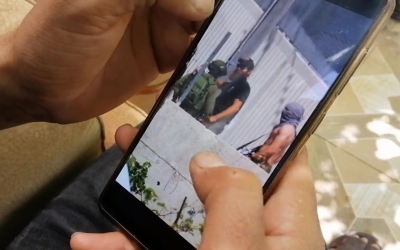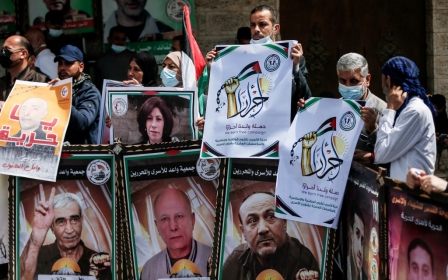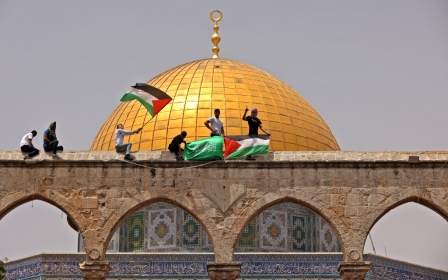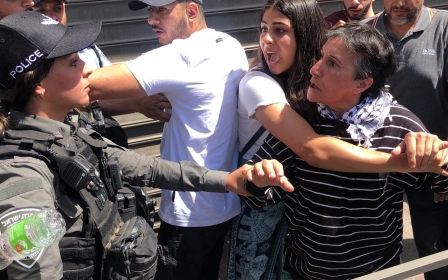Palestinians decry new West Bank restrictions on movement in wake of protests
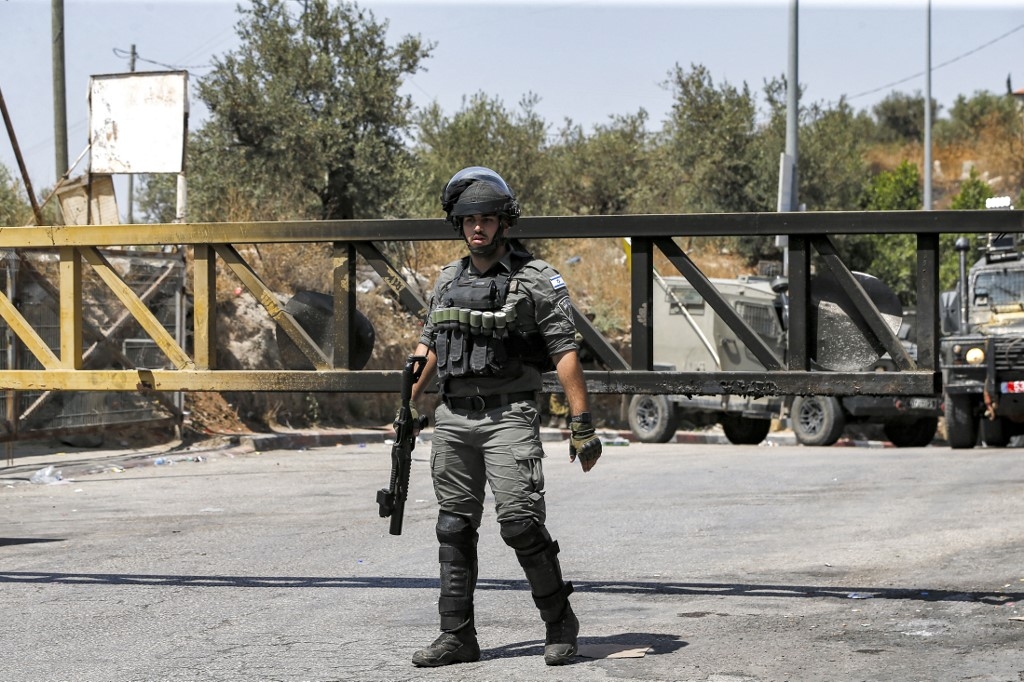
A new gate set up by Israeli forces in the occupied West Bank in the aftermath of recent tensions is seen as a deliberate policy aimed at deterring Palestinians from further protests, residents tell Middle East Eye.
On 28 May, the Israeli army closed off a main road used by seven Palestinian villages - home to about 30,000 people - in the northern occupied West Bank.
Residents of the Palestinian villages of Qarawet Bani Hassan, Bidya, Sarta, az-Zawiya, Masha, Rafat and Deir Ballout, in the northwest part of the Salfit governorate, were blocked from any movement for several hours during the day when the army closed a metal gate it had set up five days previously.
During the recent Israeli efforts to displace the residents of the Palestinian neighbourhood of Sheikh Jarrah, and the Israeli bombardment of Gaza, the area saw violent confrontations between Palestinian protesters and the Israeli army. The army set up the metal gate on 23 May, days after the Gaza ceasefire took effect.
Ibrahim al-Assi, head of the Qarawet Bani Hassan local council, said that the Israeli army road closure was a “form of collective punishment for all the area’s residents who participated in the protests recently”.
“The erection of this metal gate aims to impose a new reality on the ground, and to threaten Palestinians from protesting against any acts [by the army],” said Assi.
The Israeli army systematically closes entrances to villages and imposes lockdown on areas - from hours to days - as a form of collective punishment, a practice documented and condemned by many rights groups.
On the morning of 28 May, a peaceful protest took place in the nearby village of Deir Istya, in rejection of a new settlement outpost that was erected in the area a few days earlier. The demonstration led to confrontations in which settlers fired live ammunition at the Palestinians, who set fire to the settlers’ caravans.
The Israeli army instantly shut the metal gate it had erected on the main road and imposed a full lockdown on the area, while settlers continued to move freely and carry out attacks against Palestinians.
The area is surrounded by three large settlements named Netafim, Barkan and Maale Israel, situated on both sides of the main road used by Palestinians.
“The [Israeli] occupation is waging a proclaimed war against us as Palestinians, imposing collective punishment including through fragmenting our geography with gates and checkpoints,” added Assi. “The occupation is attempting to perpetuate the existence of these settlements and to secure their continued expansion, while Palestinians are besieged in their villages.”
Turning villages into prisons
In an October 2018 report, the United Nations Office for the Coordination of Humanitarian Affairs (OCHA), recorded 705 different obstacles set up by the Israeli army across the occupied West Bank, restricting Palestinian movement, and found that the figure was three per cent higher than it was in December 2016.
For years, the Israeli army has been setting up a chain of gates at the entrances to Palestinian villages, which it closes at a whim. Following the 2015 Jerusalem uprising, the army increased the number of gates as part of its policy to deter armed attacks and impose collective punishment on village residents.
'Closure of the gates … creates a state of repression and subjugation, and deprives us of going about normal life and carrying out our duties as farmers'
- Marwan Abdelrahman, head of the Bruqin local council
Palestinian rejection of such roadblocks and checkpoints reached its peak in 2017 in Jerusalem, after the Israeli army during Ramadan attempted to erect electronic gates at the entrance to al-Aqsa Mosque compound, leading to many protests.
In addition to closing the road near Qarawet Bani Hassan, the Israeli army closed off for several hours the main entrance to the Palestinian village of Bruqin, west of Salfit, through two iron gates it had set up there in 2019, and which it systematically closes as a form of collective punishment.
The placement of the gates, and a settlement built in the area, separate the residents of Bruqin from 5,000 dunams of their land, which the army prevents them from reaching.
Head of the Bruqin local council Marwan Abdelrahman told MEE that the mere closure of the gates “turns Bruqin into a big prison. It is a form of collective punishment imposed on Palestinians, whereas settlers are provided with everything, including freedom, expansion and infrastructure”.
“The closure of the gates does not only mean obstructing the details of our daily lives. It creates a state of repression and subjugation, and deprives us of going about normal life and carrying out our duties as farmers,” he added.
Similarly, on 19 May, the army set up earth mounds and cement blocks closing the southern and main entrance to the Palestinian village of Silwad, east of Ramallah city. Residents rejected the closure and removed the obstacles, allowing movement to resume after several hours.
Policies that ‘serve settlements’
On the western outskirts of Ramallah city is the small village of Deir Nidham - home to about 1,300 Palestinians living in an area of 4,000 dunams. The village is besieged by Israeli settlement infrastructure, including the settlement of Halamish since 1978 from the east, and settlement road 465 from the north.
In 2015, the army set up a metal gate at the entrance to the village, forcing residents to walk for a kilometre on foot to reach the main road each time the army decided to close the gate.
Residents of Deir Nidham are forced to leave their village on a daily basis for work and to carry out other basic errands. There are only three small stores in the town, which do not carry all basic groceries. The village also lacks a medical clinic, vegetable store and pharmacy.
'Due to the closure, the only school in the village was disrupted - teachers were unable to reach the school. We also faced problems in transporting patients and elderly people'
- Munjed Tamimi, head of Deir Nidham village council
On 22 May, the army arrived with bulldozers and shut down the main and only entrance to the village with earth mounds and cement blocks. The closure was imposed on Deir Nidham until 28 May.
Munjed Tamimi, head of the village council, told MEE that the army held the village of Deir Nidham responsible each time any act of protest on the settlement road took place by imposing a lockdown on the town, which he said was already besieged.
“Due to the closure, the only school in the village was disrupted - teachers were unable to reach the school. We also faced problems in transporting patients and elderly people,” said Tamimi.
“The [Israeli] occupation has no law. They always use frivolous pretexts to close the village entrance,” which is an added layer to “daily [military] raids on the village and attacks on residents - farmers in particular,” he said.
“The continued punishment imposed on the village has had a psychological and social effect on us. Some families have left the village, while many young people do not see their future here.
“The main goal of the army’s policies are to displace us from Deir Nidham and allow the settlement of Halamish to expand on our lands," he said.
"These are all systematic policies that serve the settlements.”
Middle East Eye propose une couverture et une analyse indépendantes et incomparables du Moyen-Orient, de l’Afrique du Nord et d’autres régions du monde. Pour en savoir plus sur la reprise de ce contenu et les frais qui s’appliquent, veuillez remplir ce formulaire [en anglais]. Pour en savoir plus sur MEE, cliquez ici [en anglais].


